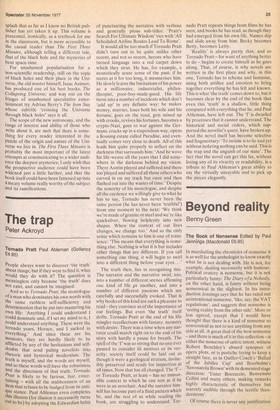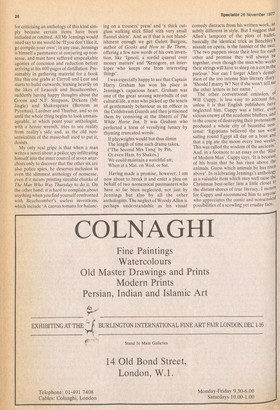Beyond reality
Benny Green
The Book of Nonsense Edited by Paul Jennings (Macdonald 6.95) In marshalling the chronicles of nonsense it is as well for the anthologist to know exactly what he is not dealing with. He is not, for example, dealing necessarily with humour. Political oratory Is nonsense, but it is not particularly funny: The Diary of a Nobody, on the other hand, is funny without being nonsensical in the slightest. In his introduction Jennings says that he has ruled out unintentional nonsense, 'like, say, the VAT regulations', and suggests that nonsense is 'seeing reality from the other side'. More or less agreed, except that I would have thought that there is a kind of nonsense so nonsensical as not to see anything from any side at all. A great deal of the best nonsense —and there is much of it in this collection — is either the nonsense of satiric intent, witness Robert Benchley's absurd synopses of opera plots, or is pastiche trying to keep a straight face, as in Quiller-Couch's 'Ballad of the Jubilee Cup' and Beerbohm's 'Savonarola Brown' with its demented stage direction: 'Enter Boccaccio, Benvenuto Cellini and many others, making remarks highly characteristic of themselves but scarcely audible through the terrific thunderstorm'.
Of course there is never any justification for criticising an anthology of this kind simply because certain items have been included or omitted. All Mr Jennings would need say to me would be 'If you don't like it, go compile your own'; in any case, Jennings is himself a pastmaster at conjuring up nonsense, and must have suffered unspeakable agonies of concision and reduction before arriving at his 400 pages of distillation. Presumably in gathering material for a book like this one grabs at Carroll and Lear and starts to build outwards, leaning heavily on the likes of Leacock and Beachcomber, suddenly having happy thoughts about the Goons and N.F. Simpson, Dickens (Mr Jingle) and Shakespeare (Bottom as Pyramus), Lardner and Thurber, and so on until the whole thing begins to look unmanageable, at which point your anthologist, with a heroic wrench," tries to see reality from reality's side and, as the old nonsensicalists of the music-hall used to put it, desists.
My only real gripe is that when a man writes a novel about a police spy infiltrating himself into the inner council of seven anarchists only to discover that the other six are also police spies, he deserves inclusion in even the slimmest anthology of nonsense, even if it means printing sizeable chunks of The Man Who MIS Thursday to do it. On the other hand, it is hard to complain about anything when you find yourself confronted with Beachcomber's useless inventions, which include 'A canvas tomato for balanc ing on a trousers' press' and 'a thick cutglass walking stick filled with very small flannel shirts'. And as if that is not blandishment enough we get Gelett Burgess, author of Gooks and How to Be Them, offering a few new words of his own invention, like Igmoil, a sordid quarrel over money matters' and `Xenogore, an interloper who keeps one from interesting things'.
I was especially happy to see that Captain Harry Graham has won his place in Jennings's capacious heart. Graham was one of the great unsung screwballs of our cultural life, a man who picked up the tenets of gentlemanly behaviour as an officer in the Coldstream Guards and then jettisoned them by conniving at the libretti of The White Horse Inn. It was Graham who perfected a form of versifying lunacy by rhyming truncated words: If playwrights would but thus dimin The length of time each drama takes, (`The Second Mrs Tang' by Pin, Or even Ham. by Shakes.) We could maintain a watchful att; When at a Mat. on Wed. or Sat.
Having made a promise, however, I am now about to break it and enter a plea on behalf of two nonsensical pastmasters who have so far been neglected, not just by Jennings but also by all the other anthologists. The neglect of Woody Allen is perhaps understandable as his visual comedy distracts from his written work, so subtly different in style, But I suggest that Allen's lampoon of the plots of ballet, basically the identical trick as Benchley s assault on opera, is the funnier of the two: 'The two puppets swear their love for each other and promise they will always he together, even though the man who works their strings will have to sleep on a cot in the parlour.' Nor can I forget Allen's demolition of the too intense Slav literary diary: 'Should I marry W? Not if she won't tell me the other letters in her name.' The other conventional omission, of Will Cuppy, is less easy to account for, unless it is that English publishers have neglected him. Cuppy was a bitter, even vicious enemy of the academic bluffers, and in the course of destroying their pretensior s produced a whole city of beautiful not sense: 'Egyptians believed the sun went sailing round Egypt all day on a boat and that a pig ate the moon every two weeks; This was called the wisdom of the ancients. And, in a footnote to an essay on the 'Pis of Modern Man', Cuppy says, 'It is becaus of his brain that he has risen above th animals. Guess which animals he has rise above'. In celebrating Jennings's antholog as a valuable item which may well raise th Christmas best-seller lists a little closer t the distant shores of true literacy, 1 mour for Cuppy and recommend him to anyoo who appreciates the comic and nonsensic possibilities of a scowling yet erudite face.







































 Previous page
Previous page